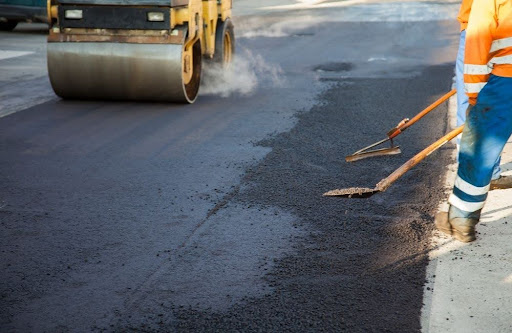
In residential communities, maintaining safe and durable driveways, roadways, and storm drains is essential, especially when preparing for future hurricane seasons. One issue that can compromise these surfaces is asphalt paving delamination. This problem not only affects the appearance of paved areas but also weakens their structure, leading to safety hazards, further deterioration, and costly repairs if not addressed promptly.
What Is Asphalt Surface Delamination?
Asphalt delamination occurs when the top layer of asphalt separates from the layer beneath it. This separation may appear as peeling, cracking, or lifting of the surface. Once this happens, water can seep into the pavement, worsening the damage and potentially leading to potholes, base failure, and erosion of the surrounding area.
Causes of Delamination in Asphalt Surfaces
Several factors can cause asphalt delamination:
- Poor Bonding Between Layers Inadequate or missing tack coat application prevents the new asphalt layer from properly bonding to the existing one.
- Moisture Contamination Water trapped between layers during installation interferes with bonding, which is especially problematic in Florida’s humid climate.
- Improper Laying Conditions Asphalt must be applied and compacted at the right temperature. If it cools too much before compaction, the layers will not adhere correctly.
- Presence of Debris Dust, dirt, or loose aggregate left on the surface can prevent strong adhesion between layers.
- Overuse of Recycled Materials While recycled asphalt can be sustainable, improper handling can weaken the bond between layers.
Fixing and Preventing Asphalt Delamination
For Repairs
Delaminated asphalt can be addressed through localized repairs or resurfacing:
- Localized repairs involve removing the damaged section, cleaning the base, applying a proper tack coat, and replacing the asphalt.
- Resurfacing may be needed for widespread issues, which includes milling, base correction, and applying a new asphalt layer with proper bonding.
Preventative Measures
- Apply a Quality Tack Coat – Ensure even coverage to maximize bonding strength.
- Maintain Proper Temperatures – Asphalt should be applied and compacted while still hot, avoiding cool or wet conditions.
- Prepare Surfaces Correctly – Keep the base clean and free of moisture, dust, or debris.
- Choose Experienced Contractors – Professionals with knowledge of local conditions and best practices can help minimize delamination risks.
Why Trust Bonness for Your Asphalt Needs
At Bonness, we deliver reliable asphalt paving solutions designed for the unique environmental conditions of Naples, FL. Our skilled team uses top-quality materials and proven techniques to ensure that driveways, roadways, and storm drains remain durable and long-lasting. By focusing on proper installation and preventative care, we help residential communities avoid problems like delamination and preserve their investments for years to come.
If you’re dealing with delamination or want to prevent it in your next project, contact Bonness today. Call us at (239) 597-6221 or fill out our online form. Our experts are ready to provide safe, lasting asphalt solutions tailored to your needs in Naples, FL.
